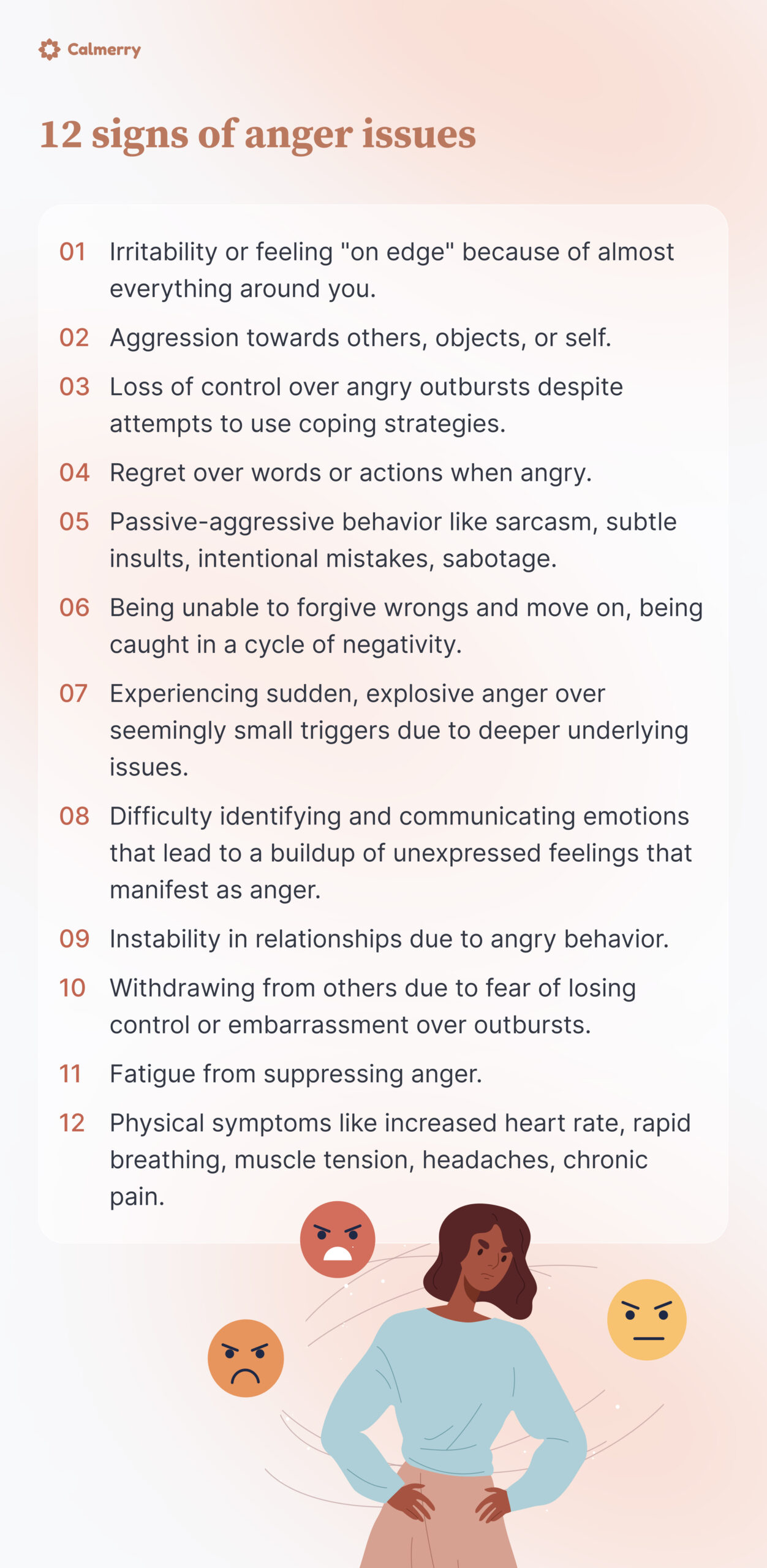12 Signs of Anger Issues and Their Causes

In the 2015 film Inside Out, anger is personified as a short, squat, red-faced creature whose head spontaneously lights on fire. The depiction is apt, as anger can feel explosive and hard to control.
But while the movie is meant to be humorous, anger is no laughing matter, especially for people with anger issues. Left unaddressed, anger issues can affect relationships, work, and even your physical health.
This article will review signs of anger issues, their underlying causes, and when to seek help.

12 signs of anger issues
1. Irritability or feeling “on edge”
Anger isn’t always explosive. Sometimes, it simmers beneath the surface, causing you to feel irritated by everyone and everything. This consistent, low-grade anger can be hard to detect as you naturally focus on the immediate trigger.
You blame the minivan who cut you off on the freeway and don’t stop to think whether your anger might have deeper roots.
Where everyday annoyances bother other people, they irk you to the point that you feel constantly on the verge of losing your temper.
2. Aggression
Aggression and anger are closely linked. Derived from the Latin verb “to attack,” aggression is the impulse to lash out physically or verbally.
Aggression can be directed towards other people, inanimate objects, or pets. Those who turn anger inward might behave aggressively towards themselves, engaging in self-destructive behavior.
3. Loss of control
Nearly everyone has lost control of their emotions at some point. However, for people with anger issues, losing control is the norm rather than the exception.
They’ve often promised themselves or others that they would better control their anger, perhaps using conventional coping strategies like counting to 10 or taking a deep breath. Still, their anger overcomes them.
4. Regret
People who struggle to control their anger often say or do things they later regret. This is because when anger is aroused, you are more likely to think irrationally and act impulsively.
Psychologist Daniel Goleman calls this “emotional hijacking,” as your emotions take over the neurological controls. Instead of thinking things through, you say or do whatever comes into your mind. Consequences can range from hurt feelings to destruction of property or worse.
5. Passive-aggressive behavior
Passive-aggressive behavior involves the indirect expression of anger with sarcasm, backhanded compliments, or sabotage.
Other examples of passive-aggressive behavior include showing up late to an event you resent having to attend, giving someone the silent treatment, and talking about someone behind their back.
People discouraged from outwardly expressing their anger may be more likely to engage in passive-aggressive behavior.
– Lindsay Renner Schwartz, Licensed Clinical Social Worker (LICSW)
6. Grudges
Generally speaking, it is helpful to remember when someone has wronged you, as you can use this information to protect yourself from future harm.
However, when this turns into a grudge – characterized by persistent feelings of resentment and ill will – you can get caught in a cycle of anger and negativity.
On the flip side, forgiveness is associated with decreased anger and improved emotional well-being. If you find it impossible to “forgive and forget,” you may have anger issues. [1] Kim, J. J., Payne, E. S., & Tracy, E. L. (2022). Indirect Effects of Forgiveness on Psychological Health through Anger and Hope: A Parallel Mediation analysis. Journal of Religion and Health, 61(5), 3729–3746. https://doi.org/10.1007/s10943-022-01518-4
7. Emotional outbursts
Have you ever been calmly going about your day when, suddenly, something puts you over the edge?
Before you can process what is happening, you are yelling, knocking over furniture, or throwing things. These anger outbursts occur with little provocation, making your reaction seem disproportionate to observers.
However, your anger in these situations is likely not due to the immediate trigger but a result of unresolved emotions and experiences. Outbursts like these are another sign of anger issues.
8. Difficulty identifying and communicating emotions
Someone with anger issues may have a hard time identifying and communicating what they are feeling. Perhaps they were never taught about emotions as children and consequently lacked the language to express them.
This deficit leads to a buildup of sadness, frustration, guilt, fear, and other emotions. Eventually, these emotions manifest as anger, as the person has no other way to convey their distress.
People with anger issues are thus likely to be misunderstood, leaving them even more frustrated and likely to lash out.
– Lindsay Renner Schwartz, Licensed Clinical Social Worker (LICSW)
9. Relationship instability
People with anger issues often experience difficulty in their relationships. Aggressive behavior, frequent outbursts, and lack of effective communication create a stressful, unpredictable environment for partners, friends, and family.
Ultimately, these loved ones may distance themselves as a way of self-preservation. As such, people with anger issues may have a hard time maintaining stable, long-term relationships.
10. Isolation
A more subtle sign of anger issues is isolation. People who have trouble managing their anger may avoid social situations due to a fear of conflict. They may fear losing control and worry about embarrassing themselves or others.
This pattern of isolation can lead to social disconnection, leaving those with anger issues with fewer healthy outlets for their anger.
11. Fatigue
Suppressing emotions takes an enormous amount of emotional energy. Consequently, people with anger issues may experience fatigue or exhaustion.
In addition, the heightened state of arousal associated with anger can disrupt sleep and make it hard to relax.
12. Physical symptoms
In addition to the above, anger is associated with various physical symptoms. When you are angry, your body enters a heightened state of arousal, characterized by increased heart rate, elevated blood pressure, and rapid breathing.
Left unmanaged, these symptoms can contribute to long-term health problems like cardiovascular disease.
Anger can also cause muscle tension, particularly in the jaw, neck, and shoulders. Over time, this can lead to headaches, migraines, or chronic pain. [2] Fernandez, E., & Turk, D. C. (1995). The scope and significance of anger in the experience of chronic pain. Pain, 61(2), 165–175. https://doi.org/10.1016/0304-3959(95)00192-u
What causes anger issues?
Anger issues have a variety of causes. Mental health conditions like depression, anxiety, and bipolar disorder can make it hard to regulate emotions, including anger.
Biological factors like genetics also contribute.
Understanding the underlying causes can help you address and manage your anger more effectively.
Here are some of the most common causes of anger issues:
Trauma
Traumatic events, such as physical or emotional abuse, inhibit your ability to regulate emotions. In addition, people who have experienced trauma often exhibit a state called hypervigilance in which they are constantly looking for the next threat.
This can leave them feeling on edge and more likely to feel anger.
Genetics
Research suggests that genetics also plays a role in the development of anger issues.
A 2005 study reported that over 60% of the correlation between life events and anger was due to genetic variation.
While an anger gene has not yet been identified, certain genetic factors may increase your risk of developing anger issues.
Environmental factors
Children learn how to express and regulate emotions from their caregivers. If you grew up in a household where anger was expressed through physical or verbal aggression, you may be more likely to exhibit this behavior yourself.
Likewise, if your caregivers suppressed their emotions or used passive-aggressive behavior to communicate their feelings, you may have a hard time expressing your anger directly.
Cultural factors
Cultural factors can also contribute to the development of anger issues. For example, in Japan, the concept of “gaman” emphasizes self-discipline and the avoidance of outward displays of emotion.
In cultures that value such stoicism, individuals may learn to internalize their anger.
On the other hand, in cultures where aggression is glorified or normalized, individuals are more likely to express anger through aggressive means.
Stress
When you experience high stress over a prolonged period, your ability to regulate emotion becomes compromised.
Chronically stressful environments, such as poverty, social instability, or systemic oppression, can cause irritability and a reduced threshold for managing anger.
– Lindsay Renner Schwartz, Licensed Clinical Social Worker (LICSW)
Unresolved stress can also lead to a buildup of negative emotions that may ultimately manifest as anger.
Neurological conditions
Certain neurological conditions increase your risk of developing anger issues. For example, traumatic brain injury, dementia, and certain types of epilepsy can impair one’s ability to manage anger effectively.
Impulse control disorders such as attention-deficit hyperactivity disorder (ADHD) heighten emotional reactivity and make it more challenging to regulate emotions, including anger.
Hormonal imbalance
In some cases, anger issues are caused by hormonal imbalances. For example, high levels of testosterone are associated with increased aggression and irritability. [3] Jhangiani, R., & Tarry, H. (2022, January 26). 9.2 The biological and emotional causes of aggression. Pressbooks. https://opentextbc.ca/socialpsychology/chapter/the-biological-and-emotional-causes-of-aggression/
Similarly, women who have premenstrual syndrome (PMS), thought to be caused by hormonal fluctuations, often experience higher levels of anger and an inhibited ability to control their anger. [4] Sağlam, H. Y., & Basar, F. (2019). The relationship between premenstrual syndrome and anger. Pakistan Journal of Medical Sciences, 35(2). https://doi.org/10.12669/pjms.35.2.232
Hormonal changes during perimenopause can likewise contribute to the development of anger issues. [5] Watson, K. (2018, September 29). How to identify and treat Perimenopause rage. Healthline. https://www.healthline.com/perimenopause-rage
Substance use
Alcohol and other drugs can lead to increased irritability and decreased inhibition. Consequently, individuals who regularly use and abuse substances may be more prone to angry outbursts and aggressive behavior.
When to seek help from a therapist
Anger is a core human emotion. Just as everyone periodically experiences anger, everyone loses control of their anger from time to time.
However, for those with anger issues, this loss of control negatively impacts their life:
- Relationships can be damaged by emotional outbursts or passive-aggressive behavior.
- Irritability impacts their work, and physical health deteriorates.
- Some may even experience legal issues as a result of their anger issues.
If your anger issues are adversely affecting your life, it may be time to seek help from a licensed therapist.
A therapist can help you explore the underlying causes of your anger and develop healthier coping mechanisms for dealing with anger.
Likewise, therapy can help you identify the emotions behind your anger, leading to increased self-awareness, improved relationships, and emotional well-being.
At Calmerry, we have experienced therapists who know how to help you. We can match you with one of them within 1 hour. Start with a quick survey.
Kim, J. J., Payne, E. S., & Tracy, E. L. (2022). Indirect Effects of Forgiveness on Psychological Health through Anger and Hope: A Parallel Mediation analysis. Journal of Religion and Health, 61(5), 3729–3746. https://doi.org/10.1007/s10943-022-01518-4
Fernandez, E., & Turk, D. C. (1995). The scope and significance of anger in the experience of chronic pain. Pain, 61(2), 165–175. https://doi.org/10.1016/0304-3959(95)00192-u
Jhangiani, R., & Tarry, H. (2022, January 26). 9.2 The biological and emotional causes of aggression. Pressbooks. https://opentextbc.ca/socialpsychology/chapter/the-biological-and-emotional-causes-of-aggression/
Sağlam, H. Y., & Basar, F. (2019). The relationship between premenstrual syndrome and anger. Pakistan Journal of Medical Sciences, 35(2). https://doi.org/10.12669/pjms.35.2.232
Watson, K. (2018, September 29). How to identify and treat Perimenopause rage. Healthline. https://www.healthline.com/perimenopause-rage
-
Learn morePersonalized online therapyChoose video, messaging, or both to fit your schedule and comfort. Get matched with your therapist within 1 hour.
-
Learn moreOne 60-minute live video sessionSee how online therapy works and get quick support with a single therapy session. No commitments.





